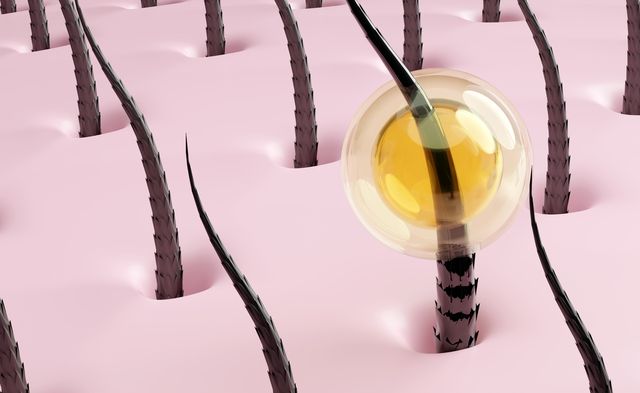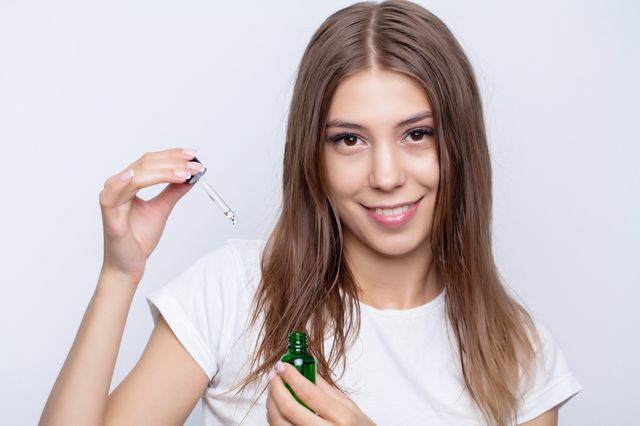
- Home
- Trend
- Weight Loss Strategies
- Acne Tips
- Hair Health Information
- Blemish Removal Tips
- Acne Scar Removal Tips
- Muscle Building Techniques
- Intimate Care Tips
- Postpartum Intimate Care
- Eye Bags Wiki
- Tips for Face Slimming
- Secret of Permanent Hair Removal
- Breast Enlargement Tips
- Cure to Snoring
- Marionette Lines
- Skin-Tightening Secrets
There’s still so much we don’t fully understand about hair growth. Many different factors can influence it, and once we identify those, we can take targeted action to address the issues. Beyond the speed of growth, it’s also essential to care for hair health—are your strands dry, tangled, or looking like straw? If you’re hoping for smooth, shiny, healthy hair, read on to learn the best tips and tricks!
6 Tips to Help Hair Grow Faster

Tip 1: Avoid Using Hot Water When Washing Hair
Hot water can damage hair follicles and cuticles, drying out the scalp and causing hair to tangle, become frizzy, and lose shine. Keep the water temperature lukewarm when washing your hair. If you’re going to a sauna or hot spring, tie up your hair and wear a shower cap to protect your scalp from high heat and moisture loss.
Tip 2: Condition Regularly
Skipping conditioner can lead to brittle, frizzy strands that feel coarse to the touch. You don’t need a salon treatment—just use conditioner, scalp essence, hair masks, or natural plant oils like jojoba or coconut oil. After shampooing, apply conditioner to the ends for just a few seconds to help lock in moisture and nutrients, supporting smoother, shinier hair.
Tip 3: Limit Hair Coloring and Heat Styling
Frequent dyeing and perming can damage follicles and the cuticle layer, making hair thinner and more prone to breakage. Try to dye your hair no more than twice a year, and avoid poor-quality dyes that can harm the scalp. Before heat styling, use a heat protectant spray and step up your conditioning routine afterward to prevent damage.
Tip 4: Brush to Massage the Scalp
Brushing isn’t just about smoothing hair—it also stimulates blood circulation in the scalp, which contains over 50 acupuncture points connected to different organs. Use a wide-tooth comb, brushing from the ends up to the mid-lengths to detangle, then comb from the roots down. This prevents tugging at knots and potential hair breakage. Brushing also removes dead skin, oil, and dirt, keeping your scalp clean.
Tip 5: Protect Hair from UV Rays
Just like skin, hair can be damaged by UV rays, leading to dryness, discoloration, and breakage. Use UV-protectant hair products or wear a hat or use an umbrella to shield hair from the sun.
Tip 6: Trim Split Ends Regularly
As hair grows, the ends are farthest from the scalp and receive the least nutrients, making them prone to dryness and split ends. Regularly trimming damaged ends allows remaining hair to absorb more nutrients, making it grow faster, stronger, and smoother.
Want Healthy Hair? Follow These 6 Daily Habits!

1. Keep your hair hydrated—moisture is essential for healthy growth.
2. Always blow-dry damp hair before bed. For long hair, tie it loosely or use a silk pillowcase to reduce friction and prevent tangles. Apply a little leave-in conditioner to minimize frizz.
3. Don’t apply shampoo directly to your scalp. Lather it into foam first, and rinse from the top down to let the foam gently cleanse the strands.
4. Blow-dry your hair right after washing. Leaving it wet for too long causes the cuticles to stay open, making hair more vulnerable to damage.
5. Avoid tying ponytails too tightly or in the same spot for long periods—it stresses the hair and causes breakage. Use hair clips or switch up hairstyles.
6. Sulfates are powerful cleansers but can over-strip oils, causing the scalp to produce even more sebum. Opt for sulfate-free, gentle shampoos to encourage healthier hair growth.
免費體驗
F8 Hair Regrowth Treatment
1 Minute Self-Registration
Date should not be before minimal date
What Nutrients Help Hair Grow?
1. Protein
Hair is made primarily of protein, so a deficiency can slow growth. Eat more high-protein foods like eggs, fish, milk, and legumes to boost hair health.
2. Biotin (Vitamin B7)
Biotin is essential for hair strength and growth. Common in hair supplements, it’s found in egg yolks, milk, bananas, walnuts, salmon, mushrooms, and sunflower seeds. It also benefits skin and nails.
3. Antioxidants (Vitamins C & E)
These help protect hair follicles from pollution and UV-induced free radicals, slowing aging of the scalp and reducing oil overproduction. Found in bell peppers, tomatoes, citrus fruits, spinach, strawberries, sunflower seeds, and broccoli. Vitamin C also aids collagen production and iron absorption, preventing breakage and hair loss.
4. Iron
Iron supports cell division and growth. Spinach is especially rich in iron, folate, vitamin C, and E—key nutrients for strong hair. Vitamin A in spinach also encourages healthy oil production to protect hair strands.
5. Omega-3 Fatty Acids
Omega-3s help increase hair density and length. Found in salmon, soybeans, chia seeds, seaweed, and walnuts.
6. Zinc
This mineral supports protein metabolism and scalp health. It plays a role in protein synthesis, which is vital since hair is mostly protein. A deficiency can lead to hair loss and dry scalp. Found in oysters, peanuts, and other shellfish.
7. Folic Acid
Folic acid aids cell division and DNA synthesis, helping to repair damaged follicles. It also supports nervous system health—important since stress and hormonal imbalances can cause hair loss (e.g., alopecia areata).
8. Beta-Carotene
Converted into vitamin A in the body, beta-carotene supports healthy hair cells and scalp. Found in carrots, bell peppers, pumpkins, melons, sweet potatoes, kale, and mangoes—but consume in moderation.
9. Vitamin D
Important for bones, immunity, and cell growth. It encourages hair cell division and can help prevent hair loss. Sun exposure boosts vitamin D levels, or get it through eggs, fish, liver, egg yolks, and whole grains.
What If Hair Stops Growing or Grows Slowly?
1. Medication
If the issue is hormone-related (like DHT sensitivity), medications such as finasteride, dutasteride, or minoxidil may help. Always consult a doctor for proper diagnosis and prescription. Topical treatments can also be used alongside medication to stimulate follicles. If hair loss stems from illness or chemotherapy, the root cause must be treated first.
2. Hair Transplant
For permanent or extensive hair loss, doctors may suggest transplanting healthy follicles to balding areas or weaving artificial hair into existing strands. These procedures take time and may irritate the scalp, so be sure to understand the risks beforehand.
3. Wigs or Hairpieces
A non-invasive way to restore confidence and style without medication or surgery. Today’s wigs are lighter, more breathable, and natural-looking. They're a great option for those with thinning hair who want to change color or style frequently without damage.
4. Low-Level Laser Therapy (LLLT)
A non-invasive, painless treatment that promotes blood circulation and boosts scalp cell metabolism to reactivate hair follicles and extend the growth phase. It’s lower risk than surgery and suitable for many people. Perfect Medical offers a free consultation for their F8 Hair Growth Laser Treatment.
Struggling with Hair Loss or Slow Growth? Try Perfect Medical’s F8 Hair Regrowth Treatment!
Maintaining healthy hair and speeding up growth doesn’t come with shortcuts. Life can be busy, and it’s not always possible to follow every step in a haircare routine—or even see results despite trying many products. But don’t give up. Try Perfect Medical’s F8 Hair Regrowth Treatment.
Using low-level laser technology, this treatment penetrates deep into the scalp to increase blood flow, deliver oxygen and nutrients to hair follicles, and create an optimal environment for hair growth. It also helps reduce inflammation and slow hair loss—for long-lasting, healthy hair.
If you want thicker, faster-growing hair, don’t wait—click the link below to register for a free trial session!
Book Now: Perfect Medical F8 Hair Regrowth Treatment免費體驗
F8 Hair Regrowth Treatment
1 Minute Self-Registration
Date should not be before minimal date
FAQ

What’s the connection between scalp health and hair growth?
A healthy scalp is key to healthy hair. A well-balanced scalp supports follicle function. If there’s too much oil, the follicles can become clogged. On the flip side, dryness leads to dandruff and itching, and constant scratching causes breakage. Use scalp serums for hydration and exfoliate regularly to regulate oil and boost growth.
How fast does hair grow each month?
Hair grows about 0.27 to 4 mm per day, averaging 1 cm per month or 10–20 cm per year. These are general estimates, as growth varies based on age, health, nutrition, hormones, and hair cycle phase. But with proper care, nutrients, sleep, and stress management, you can definitely accelerate growth.
If estrogen helps hair grow, why does postpartum hair loss happen?
Estrogen extends the lifespan of hair and delays hair fall. During pregnancy, hormone levels are at their highest, which prolongs the hair's growth phase. This is the stage when hair lengthens. Thanks to estrogen, women have a longer growth phase than men, meaning hair continues to grow longer and thicker during this period. However, after childbirth, hormone levels—especially progesterone—drop, and the hair growth cycle reverts to its pre-pregnancy state. As a result, a large number of hairs enter the resting and shedding phase all at once, causing noticeable postpartum hair loss. Fortunately, this condition is temporary. As long as new moms get enough nutrients and take good care of their scalp and hair during this period, the problem should resolve naturally over time.
How often should you wash your hair to promote growth?
In the summer, when you sweat more, washing your hair once a day is recommended to prevent buildup of dirt and oil on the scalp. In colder seasons like winter, 3–5 times a week is usually sufficient. However, if you exercise and sweat heavily, daily washing is still necessary to avoid greasy, sticky, tangled, or frizzy hair. It’s also important to choose a shampoo that suits your hair type and avoid products that are overly alkaline or harsh. When washing your hair, use your fingertips (not fingernails) to gently massage the scalp—this stimulates blood circulation and improves both scalp and hair health.
Why does diet affect hair growth?
Because the nutrients in your diet directly influence bodily functions, including hair health. People who frequently consume high-calorie, heavily seasoned foods often intake excess fats, sugars, and refined starches. These can increase free testosterone levels, which stimulate the sebaceous glands to produce more oil. Additionally, a diet high in spicy foods, alcohol, or frequent smoking can damage hair follicles and shorten the hair’s growth cycle—causing it to age and fall out faster. To promote and accelerate healthy hair growth, it's recommended to consume more protein, vitamin B12, folic acid, and essential minerals.








